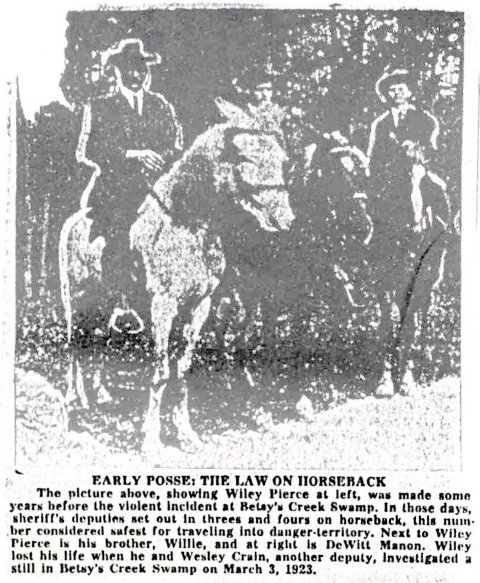History: Washington Parish, Louisiana
Submitter: Maude Ann Gilmore
Date: 3 Sept. 2006
Donated by: Bonnie Dier
Source: The Bogalusa Daily News, Sept. 1[?], 1952

Monument Records Fate of Murdered Deputies
Of a number of tragedies recorded in Washington Parish history, perhaps
the
cruelest and most unnecessary was the murder of two sheriff’s deputies,
Wiley
Pierce and Wesley Crain, on March 3, 1923, in Betsy’s Creek Swamp, the
swamplands
surrounding a Bogalusa Creek tributary south of Sheridan. Their fate is
recorded
on a large monument which stands in Franklinton’s Courthouse square.
The double murder was one of the many violent happenings of that period
of
“moonshine” distilling, and widespread violation of the law in all
parts of the
country. The era of the “Terrible Twenties” took its toll in Washington
Parish,
as in almost every county throughout the nation.
Wiley Pierce and Wesley Crain rode off early on the morning of March 3
to seek
out a moonshine still which was guessed to be operating in the Betsy
swamplands.
It is believed that upon finding the illicit still with its evidence of
moonshine
whiskey, the deputies dismounted, tied their horses, and began to
dismantle the
still equipment. However, two men engaged in its operation were
watching from
nearby cover. The two deputies were shot to death from ambush.
Then the killer devised a clever plan to cover his tracks. The mucky
swamplands
provided a shallow grave half covered with swamp water and the decayed
vegetation
of late winter. The two bodies were trampled deeply into the mud, and
covered with
the carcass of a cow. Some say the cow was killed, and others state the
animal had
died of disease and was conveniently on hand for this purpose.
As the deputies failed to return, anxiety gave place to action and many
searching
parties were formed. After every inch of the swamp had been thoroughly
covered, it
became apparent the men had met a grisly fate. Then the swampgrounds
were thoroughly
probed, and the decomposed bodies were brought to light.
The long arm of the law soon had the killer behind bars. Of the two men
involved,
one, John Murphy, was executed by hanging at a public execution held in
Franklinton;
and the other, Gideon Rester was given a life term at the state
penitentiary. There
he perished in a battle with prison inmates.
But before and after the trials, and even after sentencing, public
opinion reached
heights of indignation [missing print] that another tragedy for the
parish was
feared . . . the tragedy of a lynching party.
A tremendous crowd—some say there were 5,000 people—came to witness the
execution
in Franklinton. The accused, who had admitted and repented his guilt,
addressed the
crowds before the trap was sprung. He begged all who heard him to carry
his message
on—that liquor was an evil no habitué could surmount; that it
prompted deeds of
violence, rashness of action, and ended only in deterioration of
character, when the
victim was fortunate enough to escape other punishment.
Monument Erected
Washington Parish will never forget the two deputies who gave their
lives on the
field of honor. A few years after the tragedy a large monument was
erected on
the Southeast corner of the courthouse square in Franklinton, in honor
of Wiley
Pierce and Wesley Crain.
The rugged, chipped gray granite rock is 4 and one-half ft. wide; 6 and
one-half
ft. high and 2 and one-half feet thick. Facing the Southeast is a
bronze plaque,
engraved as follows: “To the Sacred Memory of Wiley Pierce, Born Jan.
10, 1882;
and Robert Wesley Crain, born Aug. 16, 1886; both murdered March 3,
1923.
“Two native born sons of Washington Parish, true and loyal citizens,
officers of
the law, were foully shot to death while in the performance of a
dangerous duty;
their bodies brutally trampled into the Betsy’s Creek Swamp by illicit
distillers
of “moonshine” whiskey, Lest We Forget.”
On the Northwest face of the monument is a plaque engraved as follows:
“A
testimonial to commemorate the conservative and patriotic spirit of the
people of
Washington Parish, who amidst the most trying circumstances upheld and
maintained
the supremacy and majesty of the Law.
“Faith in God, respect for constituted authority, and allegiance to our
Government
has ever been, is now, and will ever be, the very foundation of our
peace, happiness
and prosperity.
“Our citizenship is dedicated anew to the enforcement of the Law of the
Land.
The sacrifice of our brothers, whose lives were given for the welfare
of our country,
shall not have been in vain.”
